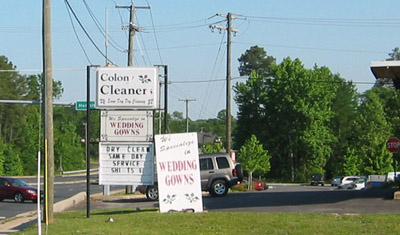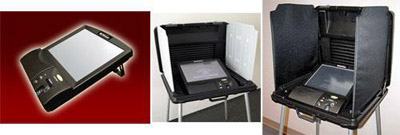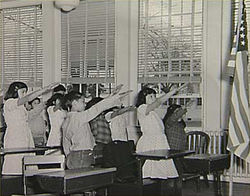You never forget your first time, do you? In my case it lasted 15 hours, and involved nine partners.
My day as an election officer started at 5:15 am. Our precinct was in a multipurpose room/gymnasium at an elementary school. We set up the signage, registration tables, five electronic voting machines and one demonstration unit with no problems, and opened the polls promptly at 6:00 am. Four volunteers worked the tables, one ran the demonstration unit, three managed the voting machines and two (the Chief and Assistant Chief) managed all procedural aspects of the election, and dealt with stuff like drive-up voting for those with special needs. We had good coverage.
I spent most of the day managing the machines. Once voters checked in, they queued up and presented paper tickets to a volunteer who (after giving the voter an “I Voted!” sticker) directed them to one of two volunteers with smart cards (I was one of these). I escorted each voter to an available machine, and inserted the smart card to activate a new ballot (this procedure serves to eliminate overvoting).
Henrico County uses Advanced Voting Solutions WinVote machines, which my friend Gokmop wrote about last year. They are Windows-based tablet PCs that reside in a plastic suitcase that transforms into a booth (pictured below).
Around 9:00 am one of the machines was unplugged and taken outside to allow a drive-up voter to cast hus ballot. When the machine was returned to its station its AC jack was not re-engaged fully, and the machine was inadvertently left to run on batteries. The battery backup is supposed to last 6-8 hours. It managed about 30 minutes before shutting down. When we booted the unit back up, it was in a locked state that required a technician employed by Henrico County to come out and deal with. We were without that machine for maybe 90 minutes. It affected the queue, but I don’t think that anyone waited over 30 minutes total. This was the only glitch of the day, and I consider it minor.
Logistically things ran pretty smoothly. There were a few incidents, such as the man standing in line who had a fairly spectacular diabetic sugar crash. He was quickly and competently attended to, and went on to cast his vote. Interestingly, this incident illustrated the extent to which suspicion has come to inform my perspective. Within seconds of assessing that the man was having a sugar crash and that two of my fellow volunteers were already acting on it, I looked over my shoulder to make sure that no one was messing with any of the machines. Now, before any of my gentle readers start planning the menu for the intervention, let me say that I genuinely believe my level of suspicion still places well up in the Healthy quadrant, but it’s a good thing of which to stay mindful. If I end up wearing foil-lined underpants and arguing with mailboxes, then you can have your intervention. Mark me down for beef.
Meanwhile, back on voting day, the mood was generally pleasant. While waiting for a machine to free up, one voter joked that his sticker was not technically accurate, since he had not yet, in fact, voted. I responded that Henrico County was examining the feasibility of providing stickers that addressed the various states of voting – “I Am About To Vote!”, “I Am Voting!”, “I Voted!”. I also pointed out to him that the sticker was in fact technically accurate if he had ever voted before. Good times.
The convivial atmosphere, for me, evaporated at the machines themselves. Over the course of the day, my dismay turned to quiet anger as I saw a meaningful percentage of citizens struggle to cast their votes. The single most important lesson that I learned on election day was that way too often these slick, new electronic voting machines do not solve the problem that they were designed and purchased to solve, while creating a laundry list of new problems.
The WinVote machines are touch screen. The voter is guided through a series of screens, each corresponding to a ballot item. The voter selects hus desired candidate for each election by touching the candidate’s name. At the end there is a summary screen that displays the voter’s choices, followed by a screen that instructs the voter to press a large flashing box labeled “VOTE” to cast the ballot.
Something about the design of that screen confused a lot of voters. When they reached it they thought they were done, and they walked away from the machine without pressing the flashing box. Maybe 25 times over the course of the day, one of my fellow volunteers or I had to chase after voters to ask them to come back and complete the process. We’re not allowed to press the box ourselves – a voter who walks away without completing the final step has hus vote invalidated. During the busiest part of the day we missed one voter. We tried advising people about the final step as we were escorting them to the machines, but one has to be careful not to over inform people who might already be intimidated by doing something unfamiliar.
The entire day, right inside the entrance to the precinct a volunteer offered straightforward tutorials with a working demonstration machine. A lot of people who really would have benefited from this passed it up either because they they were too proud, or too confident, or in too much of a hurry. Whatever the reason, when they got to the actual voting machines they became our problem. Setting aside the observation that any voting system requiring a tutorial needs rethinking, we had an election to run, and we had the equipment that the county provided to run it.
We could spot those who were going to have trouble within a few seconds of them getting in front of the machines. You could see their posture change as they encountered something unexpected. It wasn’t just the elderly voters, as one might expect. Young, old, black, white, hispanic, men, women – I assisted voters across a wide demographic spectrum.
Election officers can assist voters, but there are rules for going about it. I couldn’t just walk up beside a voter requesting assistance and look at the ballot. That requires the voter to fill out a form that both of us sign, which is time consuming and in most cases overkill. I helped two voters that required this level of attention because they were so entirely lost. The rest of the time I would stand beside the machine and ask the voter to describe the screen in front of hum, without telling me how hu intended to vote. I had the screens memorized so it was usually a simple matter of explaining the basics of navigating around. In some cases all that was necessary was to inform the voter that the system was touch screen. I had opportunities aplenty to refine my spiel, seeing as I delivered it around 100 times.
It’s important to make it explicitly clear that I don’t think the people I’m describing are stupid. The impression I formed was that they were just entirely inexperienced with something that I happen to take for granted – the graphical user interface. In one way or another I’ve been dealing with GUIs since Dad brought home Pong when I was five. I guarantee that it was the first time for many of those whom I assisted on November 7th.
This can be a hard concept for people who are completely comfortable with GUIs to grasp. In describing my election day experiences, I’ve heard numerous responses along the lines of, “It was so easy for me. I can’t imagine anyone having trouble.” Allow me to make a blanket response to this reaction:
- The world is full of things that you cannot imagine.
- Your inability to imagine them does not make them any less true.
- Touch screen voting machines were designed and purchased by people who share your inability.
We do an immense disservice to a meaningful percentage of voters by forcing them use these machines. In my precinct, several voters had thoroughly awful experiences. Some felt intimidated, some felt stupid, and some felt just that one more bit detached from a world that they used to get along in just fine. Was their experience so bad that they might not vote in the next election? I certainly hope not, but it is simply wrong to expect voters to learn a completely unfamiliar technology without at having at least one compelling reason to do so.
I will ask again, “What problem were we trying to solve?”
The usual response is, “Florida, 2000.” Much was made about hanging, pregnant or dimpled chads, and the confusing butterfly ballots. A more generic way of stating the problem is to say, “The method for capturing voter intent was flawed,” and I agree completely. The Help America Vote Act passed in 2002 allocated billions of dollars to the states to fix the problem. Setting aside the Pandora’s Box of problems that the law unleashed, its primary objective remains unrealized, and postmortem articles like the Washington Post’s “Voting System Worked, With Some Hiccups” amount to little more than whistling past the graveyard.
I guess it depends on how low one sets the bar for declaring that something “worked.” Did the voting system “work” because most of the machines didn’t visibly malfunction? Did it “work” because people didn’t have to wait that much longer than they used to? Did it “work” because more voters and election volunteers than not were comfortable setting up and operating the machines? Did it “work” because at the end of the day most of the non-auditable black boxes produced totals that added up to the total number of people who checked in?
We can do so much better than this. We can start by demanding that our voting system be great, not merely good enough.
My day as an election officer was highly educational and worthwhile, and I look forward to doing it again. The people with whom I worked were top shelf – genuinely dedicated to ensuring a fair and accurate election. They were also very kind and accepting of me, a first-timer and a snot-nosed whippersnapper. We had opportunities to chat during brief lulls in the day. We talked about how good the turnout was, we compared home addresses and made fun of the new McMansion™ development nearby. We talked about past elections, and our concerns with or confidence in the new machines. Leaving the gym at 8:00 pm, I knew that whatever shortcomings our current voting system has, people like these nine were certainly not among them.




